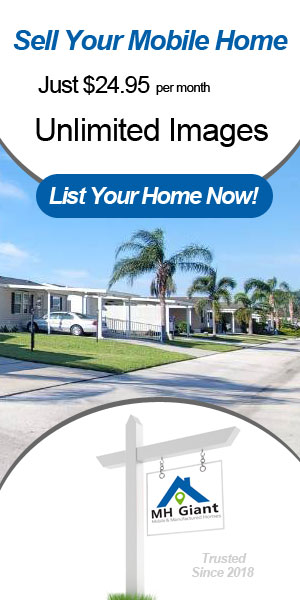Key Takeaways
- Always inspect before you buy — Skipping a thorough inspection can leave you with costly hidden repair issues later.
- Understand zoning, land requirements & costs — Know local zoning laws, lot rent, and full purchase/ownership expenses before committing.
- Research financing, resale potential & community — Different loan types, depreciation, and park/community rules can significantly impact your long-term satisfaction.
- Location matters — Even an affordable mobile home won’t feel like home if it’s in a poorly located or unsuitable area.
What not to do when buying a mobile home
Buying a mobile home can be an exciting and affordable way to achieve homeownership, but it’s important to avoid certain common pitfalls that can turn a dream purchase into a costly mistake.
Whether you’re a first-time buyer or have purchased a home before, the unique aspects of mobile home buying require careful consideration. To help you navigate the process, here are 10 common mistakes to avoid when buying a mobile home.
Table of Contents
1. Skipping the Inspection
One of the biggest mistakes any homebuyer can make is skipping the home inspection. Mobile homes, just like traditional homes, require a thorough inspection to identify potential problems such as structural damage, plumbing or electrical issues, or mold. Even if the home looks great on the outside, hidden problems could cost thousands in repairs down the line.
Mobile homes can be particularly susceptible to moisture problems, given their construction materials and the way they’re set on foundations. Water damage can compromise the structural integrity of a mobile home and lead to costly repairs. Having a certified inspector evaluate the roof, walls, and underbelly of the home will help identify any moisture-related problems before they worsen. Additionally, electrical systems in older mobile homes may not be up to modern standards, so it’s critical to ensure that everything is safe and up to code.
Always hire a certified inspector to ensure you’re making a sound investment. A few hundred dollars spent upfront on an inspection can save you from unforeseen repairs and issues down the road. This will help you avoid one of the 10 common mistakes to avoid when buying a mobile home.

2. Ignoring Zoning and Land Restrictions
Before purchasing a mobile home, it’s crucial to understand the zoning laws and land restrictions in the area where you plan to place the home. Different areas may have specific regulations about the type of home allowed on the property or requirements for foundation types and sizes. Some places may only allow mobile homes in designated communities, so always check local zoning ordinances to ensure your plans align with the legal guidelines.
Many buyers make the mistake of assuming that mobile homes can be placed anywhere, but local ordinances can vary greatly. In some cases, mobile homes may need to be placed on a permanent foundation to comply with zoning laws. Additionally, certain areas may have restrictions on the age or size of the mobile home allowed. Failing to check these regulations can result in costly delays or even force you to move the home later.
Make sure to research both the land you’re buying and any associated community rules to avoid any legal or logistical problems.
3. Not Budgeting for Lot Rent
If you plan to place your mobile home in a mobile home park or community, you’ll likely be required to pay monthly lot rent. Many buyers overlook this ongoing expense, which can range from a few hundred to several thousand dollars a month, depending on the location and amenities.
Be sure to include lot rent in your budget to avoid financial strain after your purchase.
Lot rent is often a non-negotiable expense and can vary widely depending on the park or community. Some mobile home parks offer great amenities like pools, fitness centers, and security services, but these perks often come with a higher lot rent. In addition to the rent, some parks charge additional fees for things like garbage collection, water usage, or maintenance of common areas.
When budgeting, be sure to account for all possible expenses and make sure that the combined cost of your mortgage (if applicable) and lot rent fits comfortably within your budget.
4. Failing to Research Financing Options
Financing a mobile home isn’t always as straightforward as getting a traditional mortgage. Some lenders consider mobile homes personal property rather than real estate, which can result in different lending terms or higher interest rates. Research your financing options, including FHA loans, personal property loans, or chattel mortgages, to find the best fit for your situation. Additionally, many mobile home parks may have financing partners to help streamline the process.
It’s important to note that a mobile home classified as personal property will not appreciate in value the way real estate does. This can affect your loan terms and options, as some traditional mortgage lenders may not offer loans for personal property. On the other hand, if your mobile home is placed on a permanent foundation and titled as real estate, you may be eligible for a conventional mortgage or an FHA loan, which often comes with lower interest rates.
Be sure to shop around for lenders and carefully compare interest rates, loan terms, and eligibility requirements. Understanding your financing options will help you make a better decision and avoid paying more than you need to.
5. Overlooking Resale Value
It’s important to consider the resale value of your mobile home before you buy. Unlike traditional homes, mobile homes tend to depreciate in value over time, especially if they are not on a permanent foundation. If you plan to sell your mobile home in the future, look for factors that could impact the resale value,  such as the condition of the home, its age, location, and the amenities available in the surrounding community.
such as the condition of the home, its age, location, and the amenities available in the surrounding community.
Mobile homes that are well-maintained, updated, and located in desirable communities or areas tend to hold their value better. Homes on permanent foundations typically appreciate in value more than those on temporary foundations or leased land. Additionally, newer homes and those with modern features like energy-efficient windows or high-quality appliances can make the home more attractive to potential buyers.
If resale value is important to you, make sure you’re investing in a mobile home that has long-term appeal and consider its location carefully.
6. Choosing the Wrong Size Home
One of the great things about mobile homes is the variety of sizes and floor plans available. However, choosing the wrong size home for your needs can be a costly mistake. Before buying, carefully assess how much space you’ll require, taking into account your family size, lifestyle, and any plans for future growth.
Mobile homes come in single-wide, double-wide, and even triple-wide options, and each has its advantages. A smaller single-wide home may be more affordable and easier to maintain but could feel cramped if you have a larger family or plan to entertain guests often. A double-wide home offers more space and flexibility but can come with higher upfront and maintenance costs.
Carefully weigh your current needs and any future changes in lifestyle before deciding on the size of your mobile home.
7. Not Understanding the Full Costs
Beyond the purchase price of the mobile home, there are other costs to consider. These include transportation fees to move the home to its location, installation costs, utility hook-up fees, insurance, and maintenance. Additionally, if the home is part of a mobile home park, there may be HOA fees or community upkeep costs. Be sure to factor in all potential costs to avoid unpleasant surprises later.
The transportation and installation of a mobile home can be significant expenses, especially if you’re moving the home over a long distance or placing it in a location with specific foundation or utility requirements. Insurance for mobile homes can also be more expensive than for traditional homes due to the potential risks of wind damage, fire, or theft.
Make a comprehensive list of all potential costs and account for them in your overall budget to avoid being caught off guard by unexpected fees.
8. Neglecting to Verify Ownership or Title
Before purchasing a mobile home, it’s essential to verify that the seller has clear ownership of the home. A mobile home is often considered personal property, so it requires a title, much like a car. Always request to see the title and verify that it’s free of liens or legal issues. Buying a home with a disputed or unclear title can lead to costly legal complications in the future.
Make sure to verify that the seller is the rightful owner and that the title is clear of any outstanding loans, liens, or claims. Checking the title status will save you from any future legal disputes and ensure that your purchase is secure.
9. Not Researching the Community
If you’re planning to live in a mobile home park, it’s vital to research the community before committing. Some parks have specific rules about pets, exterior decorations, or maintenance responsibilities. Make sure the park aligns with your lifestyle and preferences. Additionally, investigate the park’s reputation, including how well it’s maintained, security, and the quality of amenities offered, like clubhouses or swimming pools.
Your quality of life will be heavily influenced by the community you choose, so take the time to read reviews, talk to current residents, and even visit the park in person before making a decision.
10. Underestimating the Importance of Location
Wrapping up our list of 10 common mistakes to avoid when buying a mobile home is location, location, location! Like any real estate purchase, location plays a huge role in the quality of life and future value of your mobile home. A great mobile home in a poorly maintained or inconveniently located park may not be as enjoyable to live in or as easy to sell. Consider factors like proximity to schools, shopping centers, healthcare facilities, and public transportation when choosing your location.
The location of your mobile home will influence not only your day-to-day comfort but also its long-term value. Take time to research and choose a location that suits your lifestyle and offers conveniences and amenities that will enhance your living experience.

Bonus Tip: Inadequate Insurance Coverage
Added bonus tip to 10 common mistakes to avoid when buying a mobile home! Mobile homes require specific insurance coverage, and it’s important not to cut corners when choosing a policy. Standard homeowners insurance may not apply to mobile homes, so be sure to get the appropriate coverage to protect against risks like natural disasters, theft, or accidents. Review multiple insurance quotes to find the best coverage for your needs and avoid being underinsured.
Summary
Buying a mobile home can be a great way to achieve homeownership at an affordable price, but it’s essential to follow these 10 common mistakes to avoid when buying a mobile home to ensure a smooth and successful experience. From understanding zoning laws and budgeting for ongoing expenses to choosing the right size and verifying ownership, each step of the buying process requires careful attention.
By doing your research, planning ahead, and working with experienced professionals, you can avoid costly errors and make a smart investment in your new mobile home.

